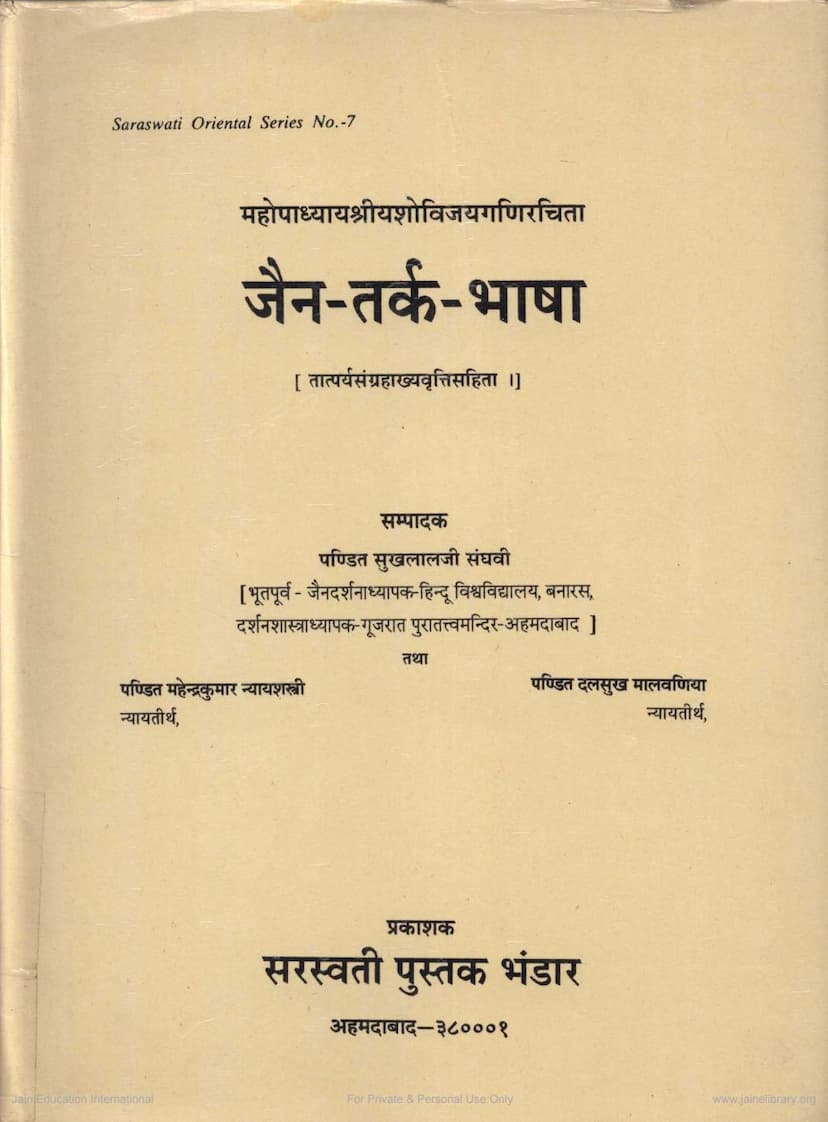Jain Tarka Bhasha
Added to library: September 2, 2025

Summary
The provided text is the title page and preliminary material for the book "Jaina Tarkabhaṣā" by Mahopadhyāya Śrī Yasovijaya Gaṇi, with a commentary called "Tātparyasaṅgraha". The book has been edited by Pandit Sukhlalji Sanghavi, Pandit Mahendra Kumar Sastri, and Pandit Dal Sukh Malvania, and published by Saraswati Pustak Bhandar, Ahmedabad. The text is in Sanskrit and Gujarati.
Here's a summary of the key information presented in the preliminary pages:
Book Title: Jaina Tarkabhāṣā (जैन-तर्क-भाषा) Author: Mahopadhyāya Śrī Yasovijaya Gaṇi (महोपाध्यायश्रीयशोविजयगणिरचिता) Commentary: Tātparyasaṅgraha (तात्पर्यसंग्रहाख्यवृत्तिसहिता) Editors: Pandit Sukhlalji Sanghavi, Pandit Mahendra Kumar Sastri, Pandit Dal Sukh Malvania (पण्डित सुखलालजी संघवी, पण्डित महेन्द्रकुमार न्यायशस्त्री, पण्डित दलसुख मालवणिया) Publisher: Saraswati Pustak Bhandar, Ahmedabad (सरस्वती पुस्तक भंडार, अहमदाबाद) Series: Saraswati Oriental Series No.-7 (सरस्वती ओरिएण्टल सीरीज नं.-७) First Edition: 1938 Reprint: 1993 Price: Rs. 125
Content Overview (based on the introductory notes and table of contents):
The introductory sections discuss the significance of the "Singhi Jain Granthamala" (सिंघी जैन ग्रन्थमाला) in publishing scholarly Jain works. Initially, the series focused on historical subjects due to the editors' passion and the availability of scattered historical material in Jain tradition. The introduction highlights the importance of historical context for understanding philosophical ideas.
However, with the publication of "Jaina Tarkabhāṣā," the Granthamala embarks on a new phase, focusing on the philosophical and logical (Tarka) aspects of Jainism. The introduction emphasizes the profound philosophical contributions of Jain scholars, particularly their foundational concept of Ahiṃsā (non-violence) and its central role in achieving liberation.
The text delves into the rich tradition of Jain logic and philosophy, highlighting that Jain thinkers were active participants in the intellectual debates of ancient India, engaging with Brahmanical and Buddhist philosophical systems. They introduced novel arguments, established unique doctrines, and contributed significantly to the understanding of concepts like soul, universe, and time. The summary notes that Jain scholars explored various branches of philosophy, including ethics, metaphysics, and epistemology.
Key Philosophical Contributions Mentioned:
- Ahiṃsā (Non-violence): Presented as a fundamental Jain philosophical principle, considered a supreme means to peace and liberation.
- Anekānta (Non-absolutism/Pluralism): A core Jain doctrine that emphasizes the multiplicity of viewpoints and the interconnectedness of reality.
- Syādvāda (Conditional Predication): The logical methodology derived from Anekānta, using "syāt" (perhaps/maybe) to express partial truths about reality. This approach is credited with fostering a balanced and comprehensive understanding of truth.
- Epistemology and Logic (Pramāṇa and Naya): The book "Jaina Tarkabhāṣā" itself is a foundational text on Jain logic, systematically explaining the nature of knowledge and reality. The table of contents reveals detailed discussions on:
- Pramāṇa (Sources of Knowledge): Including an analysis of Pramāṇa in general, Pratyakṣa (direct perception) and Parokṣa (indirect perception), with further classifications of each.
- Naya (Partial Standpoints): Explaining various modes of understanding reality, such as Dravyārthika (substance-oriented) and Paryāyārthika (mode-oriented) perspectives, and their sub-categories.
- Nikṣepa (Categorization/Classification): Discussing methods of classifying reality, including Nama (name), Sthāpanā (representation), Dravya (substance), and Bhāva (mode).
- Critical Examination of Other Philosophies: The introduction notes that Jain scholars critically analyzed and debated with other philosophical schools, including Buddhist and Brahmanical ones. They also engaged with various heterodox traditions like Ājīvika and Cārvāka.
- Emphasis on Reason and Evidence: Jain Tarka emphasizes the importance of logical reasoning and evidence over blind faith. It advocates for accepting conclusions based on their rational coherence, regardless of their source.
Author's Background:
The introduction provides a biographical sketch of Mahopadhyāya Śrī Yasovijaya Gaṇi. He was born in Gujarat, received initiation at a young age, and pursued advanced studies in various philosophical and logical systems, notably at Kashi. He gained titles like "Nyāyavishārad" and "Nyāyāchārya" and was recognized for his profound scholarship and ability in debate. His intellectual journey, particularly his deep study of Nyāya and other Indian philosophies, is seen as crucial to his ability to synthesize and articulate Jain philosophical principles in a rigorous logical framework. The text highlights his prolific writing across Sanskrit, Prakrit, Gujarati, and Hindi, covering a wide range of subjects from Vedic Yoga to Digambara philosophical texts.
Commentary (Tātparyasaṅgraha):
The commentary, "Tātparyasaṅgraha," aims to clarify the subtle and complex arguments presented in "Jaina Tarkabhāṣā." The commentators note that the original text, due to its conciseness and use of specialized terminology, could be challenging for ordinary students. The commentary is structured with two main approaches:
- Collection (Saṅgraha): Where necessary passages from earlier important works like "Maladhārīvr̥tti" and "Syādvādaratnākara" are collected to provide context and historical grounding for Yasovijaya's points.
- Explanation of Intent (Tātparya): To elucidate the deeper meaning and implications of Yasovijaya's statements, particularly in difficult or abstruse sections, and to explain the technical terms of Navya-Nyāya (New Logic) used in the text.
Overall Significance:
"Jaina Tarkabhāṣā," with its commentary, is presented as a vital text for understanding the logical and philosophical foundations of Jainism. It represents a significant effort to analyze and present Jain doctrines within the broader landscape of Indian philosophical thought, bridging the gap between traditional Āgamic teachings and rigorous logical inquiry. The publication is seen as a crucial step in making this rich philosophical heritage accessible to a wider audience.